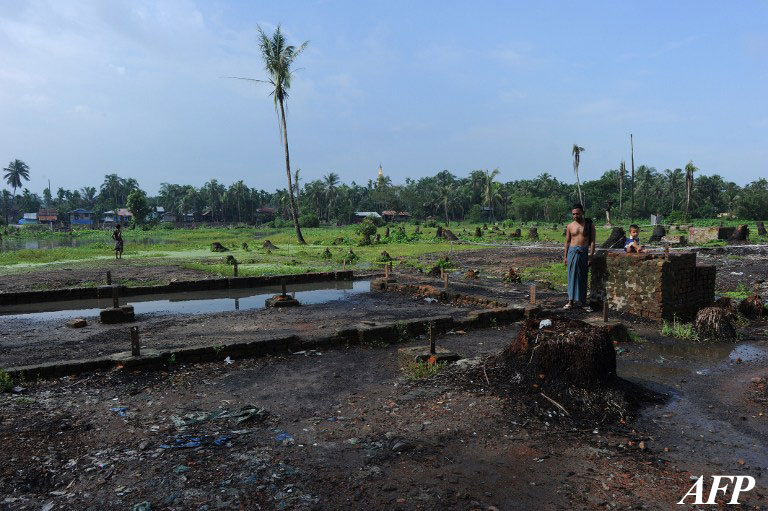The UN High Commissioner for Refugees (UNHCR) has called on Bangladesh to open its borders to Rohingyas fleeing sectarian violence in Burma.
 This picture taken on Oct. 12, 2012, shows a Muslim Rohingya man standing next to the ruins of his burned house on the edge of the Aung Mingalar quarter, which has been turned into a ghetto since violence wracked the city of Sittwe, the capital of Burma's western Rakhine state. Photo: AFP
This picture taken on Oct. 12, 2012, shows a Muslim Rohingya man standing next to the ruins of his burned house on the edge of the Aung Mingalar quarter, which has been turned into a ghetto since violence wracked the city of Sittwe, the capital of Burma's western Rakhine state. Photo: AFP
On Monday, Agency France Presse reported that clashes have left at least 88 people dead this month, according to authorities, who said up to 28,000 people have been displaced after waves of arson destroyed their homes.
Hundreds of homes were burned down over the weekend, said reports.
Bangladesh should not forcibly return refugees originating from Rakhine State to Burma, Pia Paguio, a senior protection officer and officer-in-charge of UNHCR in Dhaka, told IRIN, the UN humanitarian news agency, on Monday.
Bangladesh has repeatedly said it will not accept any Rohingya refugees fleeing ethnic violence in western Rakhine State. Hundreds of thousands of Rohingya have fled persecution in Burma over the past three decades, the vast majority to Bangladesh in the 1990s.
Up to 84 people were killed, and more than 4,600 houses and several religious buildings destroyed in the unrest, according to reports from the area.
Tensions had increased after monks, and women’s and youth groups organized anti-Rohingya and anti-Organization of Islamic Cooperation demonstrations in Sittwe, Mandalay and Yangon, the UN said.
The latest displacement comes on top of the 75,000, mostly Rohingya Muslims, who were displaced after communal violence erupted in June.
At least 78 people were killed and close to 5,000 homes and buildings were destroyed in that incident.
Most of the recently displaced are currently in nine overcrowded camps in Sittwe, separated from the rest of the community due to security concerns.
There are more than 200,000 Rohingya in Bangladesh today, including more than 30,000 documented refugees living in two government-run camps (Kutupalong and Nayapara) within 2km of the Burmese border, according to UNHCR.
UNHCR has not been permitted to register newly arriving Rohingya since mid-1992. Most Rohingya are living in villages and towns in the Cox’s Bazar area and receive little to no assistance as the agency is only allowed to assist those who are documented.
UNHCR does not have access to the 193 kilometres Burma-Bangladesh border to verify the situation of persons arriving from Rakhine State. Moreover, Bangladesh's closed border policy remains in effect.
Despite repeated advocacy efforts by UNHCR, civil society and the diplomatic community, Dhaka, fearing a major influx, closed its borders to persons fleeing communal violence Burma in June.
Bangladesh is not a signatory to the 1951 Refugee Convention or its 1967 Protocol.
“UNHCR reiterates its readiness to provide protection and assistance to the governments and the people of Bangladesh and Myanmar in addressing this evolving humanitarian situation,” said a UN spokesperson.


